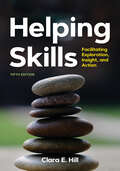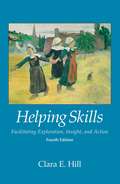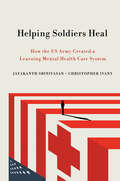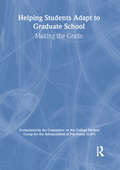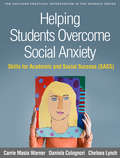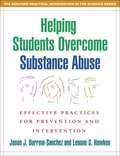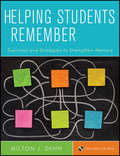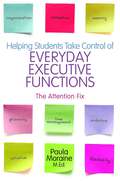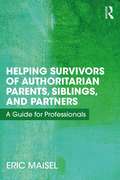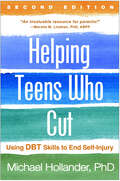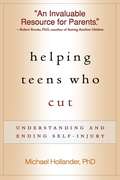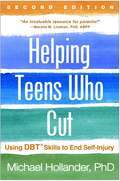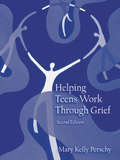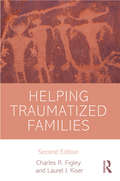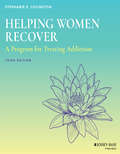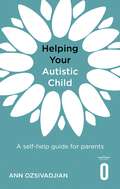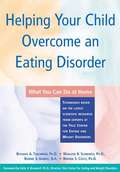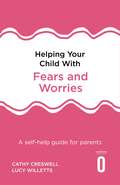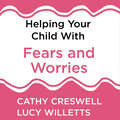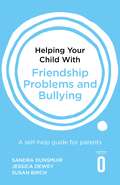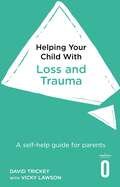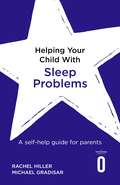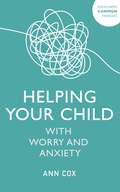- Table View
- List View
Helping Skills: Facilitating Exploration, Insight, and Action
by Clara E. HillIn this fifth edition of her best‑selling textbook, Clara Hill presents an updated model of essential helping skills for undergraduate and first‑year graduate students. Hill&’s model consists of three stages—exploration, insight, and action—in which helpers guide clients in exploring their thoughts and feelings, discovering the origins and consequences of maladaptive thoughts and behaviors, and acting on those discoveries to create positive long‑term change. This book synthesizes the author&’s extensive clinical and classroom experience into an easy‑to‑read guide to the helping process. Aspiring helping professionals will learn the theoretical principles behind the three‑stage model and fundamental clinical skills for working with diverse clients. Hill also challenges students to think critically about the helping process, their own biases, and what approach best aligns with their therapeutic skills and goals. New to this edition are: detailed guidelines for developing and revising case conceptualizations, expanded coverage of cultural awareness, updated case examples that reflect greater diversity among clients and helpers, and additional strategies for addressing therapeutic challenges.
Helping Skills: Facilitating Exploration, Insight, and Action (Fourth Edition)
by Clara E. HillThe book intends to support students' development as helpers and provides challenges to facilitate the development of helping skills.
Helping Soldiers Heal: How the US Army Created a Learning Mental Health Care System (The Culture and Politics of Health Care Work)
by Jayakanth Srinivasan Christopher IvanyHelping Soldiers Heal tells the story of the US Army's transformation from a disparate collection of poorly standardized, largely disconnected clinics into one of the nation's leading mental health care systems. It is a step-by-step guidebook for military and civilian health care systems alike. Jayakanth Srinivasan and Christopher Ivany provide a unique insider-outsider perspective as key participants in the process, sharing how they confronted the challenges firsthand and helped craft and guide the unfolding change.The Army's system was being overwhelmed with mental health problems among soldiers and their family members, impeding combat readiness. The key to the transformation was to apply the tenets of "learning" health care systems. Building a learning health care system is hard; building a learning mental health care system is even harder. As Helping Soldiers Heal recounts, the Army overcame the barriers to success, and its experience is full of lessons for any health care system seeking to transform.
Helping Students Adapt to Graduate School: Making the Grade
by Chairperson Robert L. Arnstein, Md Varda Backus, Md, Chairperson Robert L. Arnste SilberHelp graduate students cope with the pressures of school, finances, family, and professors! In order to succeed in school: The college undergraduate just has to be able to find and operate an elevator in the campus high-rise The master's degree student has to climb the side of the building The PhD student doing research with a professor has to jump over the building in a single bound, carrying the professor That bit of grim humor contains a bitter kernel of truth. Helping Students Adapt to Graduate School is the first book that focuses on the unique problems of graduate students and the best ways to counsel and support them. Graduate and professional schools are draining - emotionally, financially, and physically. In addition to coping with the pressures of classes and high performance expectations, many graduate students juggle multiple lives, trying to please their professors, maintain their status as adults, pay for books and classes and rent and food, keep up a place to live, preserve their marriages, raise their children, and deal with their parents, all while they work as teaching assistants, resident advisors, or research assistants. When adults return to school, they may find themselves forced into a childlike status, causing considerable resentment or regression and sometimes reawakening old conflicts. Furthermore, the relationship of professors and graduate students is often complex and emotionally enmeshed, tinged with issues of respect, rivalry, and even romance. Not surprisingly, many graduate students find the conflicts overwhelming at times. With fascinating case studies and lucid explanations, Helping Students Adapt to Graduate School offers a clear look at the special difficulties of graduate students and practical ways the university can help, including: fostering a sense of belonging providing year-round mental health services helping students handle financial pressures and career decisions supporting the unique needs of minority, international, married, and older students understanding the hidden subtext of faculty-student relationships encouraging a balance of family and school Helping Students Adapt to Graduate School is an essential resource for deans, administrators, professors, and counselors working with graduate students. By illuminating the complex interplay between the university environment and the inner psychological life of graduate students, it will help you provide supportive services to the students in your campus community.
Helping Students Overcome Social Anxiety: Skills For Academic And Social Success (sass) (The Guilford Practical Intervention In The Schools Series)
by Carrie Masia Warner Daniela Colognori Chelsea LynchSocial anxiety disorder causes significant distress and academic impairment for many adolescents. This unique book gives front-line school professionals innovative, easy-to-use tools for identifying and intervening with socially anxious students in grades 6–12. It presents Skills for Academic and Social Success (SASS), a school-based intervention with demonstrated effectiveness. Case examples and sample scripts demonstrate how to implement psychoeducation, cognitive strategies, social skills training, exposure, and relapse prevention with groups and individual students. In a large-size format with lay-flat binding for easy photocopying, the book includes 22 reproducible handouts. Purchasers get access to a Web page where they can download and print the reproducible materials. This book is in The Guilford Practical Intervention in the Schools Series, edited by T. Chris Riley-Tillman.
Helping Students Overcome Substance Abuse: Effective Practices for Prevention and Intervention
by Leanne S. Hawken Jason J. Burrow-SanchezTwo professors at the University of Utah explore adolescent substance abuse prevalence, assessment, prevention, group interventions, individual interventions, and the referral process. Intended for school mental health professionals, the guide outlines the major substances of abuse, the steps in the screening process, research-based prevention programs, the developmental stages of therapy groups, and an action plan for community-based services. Annotation ©2007 Book News, Inc., Portland, OR (booknews.com)
Helping Students Remember
by Milton J. DehnA hands-on memory-training program for children and adolescents featuring dozens of practical, evidence-based memory exercises A practical workbook designed to assist students whose academic learning is suffering due to a memory deficit or ineffective utilization of their memory capabilities, Helping Students Remember provides numerous strategies and methods to strengthen memory, including chunking, organization, keyword, self-testing, pegword, loci, and mnemonics. Drawing on the author's extensive training and experience, this useful resource presents effective techniques and lessons on: How memory works Memorization methods Goals for improving memory Repetition Using cards to build memory Grouping words by category Study skills that help memory Using arithmetic to build memory Using music to remember Improving recall during tests Creating and using review sheets Picturing verbal information Using context cues Plans for using memory strategies With an accompanying CD containing all of the worksheets and word lists for reproduction, Helping Students Remember is the first workbook of its kind for general psychologists, school psychologists, and special education teachers, offering practical, easy-to-implement, and evidence-based methods for working with children with memory impairments.
Helping Students Take Control of Everyday Executive Functions: The Attention Fix
by Paula MoraineThis book presents an innovative model for supporting executive function in students with attention, memory, organization, planning, inhibition, initiative, and flexibility difficulties, including those with ADHD, ADD, autism spectrum disorders and related conditions. The author advocates a student-centred approach in which educators first explore 8 key 'ingredients' with the student: relationships; strengths and weaknesses; self-advocacy and responsibility; review and preview; motivation and incentive; synthesis and analysis; rhythm and routine; and practice and repetition. She provides a step-by-step explanation of how these 'ingredients' can then be used in different ways and in different combinations to successfully address particular areas of difficulty. The approach is clearly explained, and the book contains many useful examples, practical tips and strategies, suggested conversation starters, sample time management plans and other tools that can be adapted to meet the particular needs of individual students. Original and effective, the approach outlined in this book will be of interest to teachers and other professionals involved in supporting executive function in students of all ages, as well as parents and carers.
Helping Survivors of Authoritarian Parents, Siblings, and Partners: A Guide for Professionals
by Eric MaiselHelping Survivors of Authoritarian Parents, Siblings, and Partners considers the notion of the authoritarian personality in a family context and examines the extent to which authoritarians traumatize the people closest to them. Building on primary research, Dr. Maisel presents first-person accounts of life with authoritarian family members and provides clinicians and other professionals with tactics and strategies for helping clients who struggle with the impact of these experiences. This unique look at authoritarians at home serves to redefine the authoritarian personality, expand our understanding of family trauma, and give voice to the silent epidemic of authoritarian wounding.
Helping Teens Who Cut, Second Edition: Using DBT Skills to End Self-Injury
by Michael HollanderDiscovering that your teen &“cuts&” is every parent's nightmare. Your most urgent question is: "How can I make it stop?" Tens of thousands of worried parents have turned to this authoritative guide for information and practical guidance about the growing problem of teen self-injury. Dr. Michael Hollander is a leading expert on dialectical behavior therapy (DBT), the most effective treatment approach for cutting. Vivid stories illustrate how out-of-control emotions lead some teens to hurt themselves, how DBT can help, and what other approaches can be beneficial. You'll learn practical strategies for talking to teens about self-injury without making it worse, teaching them skills to cope with extreme emotions in a healthier way, finding the right therapist, and helping reduce stress for your whole family. Incorporating the latest research, the second edition offers a deeper understanding of the causes of self-injury and includes new DBT skills.
Helping Teens Who Cut: Understanding and Ending Self-injury
by William Pollack Michael HollanderDiscovering that your teen "cuts" is absolutely terrifying; before you understand what really motivates cutting, you may worry your child is contemplating suicide. What can you do to help when every attempt to address the behavior seems to push him or her further away? In this compassionate, straightforward book, Dr. Michael Hollander, a leading authority on self-injury, spells out the facts about cutting--and what to do to make it stop. You'll learn how overwhelming emotions lead some teens to hurt themselves, and how proven treatments--chief among them dialectical behavior therapy (DBT)--can help your child become well again. Helping Teens Who Cut demonstrates how to talk to your teen about cutting without making it worse, and explains exactly what to look for in a therapist or treatment program. Drawing on decades of clinical experience as well as the latest research, Dr. Hollander provides concrete ways to help your son or daughter cope with extreme emotions without resorting to self-injury. You'll also learn practical communication and problem-solving skills that can reduce family stress, making it easier to care for yourself and your teen during the recovery process.
Helping Teens Who Cut: Using DBT® Skills To End Self-Injury
by Michael R. HollanderMy interest in teens who self-injure was sparked by a conversation I overheard between two adolescent girls at a hospital and school for troubled kids. I was in my first year of postdoctoral training, and what I heard made me think they were just striking a pose: They were sharing with each other the benefits of self-injury.
Helping Teens Work Through Grief
by Mary Kelly PerschyThe second edition of Helping Teens Work Through Grief provides a more complete and updated manual for facilitators of teen grief groups. It includes additional background information about developmental aspects of teens, the process of grief, aspects of trauma and its effects on teens, the value of a group, determining the group-appropriateness of particular teens, and parental involvement. The many details involved with beginning a group - publicity, interviews, registration, structure, closure, evaluation, and follow-up - are listed.
Helping Traumatized Families: Systemic Strategies (Psychosocial Stress Series)
by Charles R. Figley Laurel J. KiserThe new edition of the classic Helping Traumatized Families not only offers clinicians a unified, evidence-based theory of the systemic impact of traumatic stress—it also details a systematic approach to helping families heal by promoting their natural healing resources. Though the impact of trauma on a family can be growth producing, some families either struggle or fail to adapt successfully. Helping Traumatized Families guides practitioners around common pitfalls and toward a series of evidence-based strategies that they can use to help families feel empowered and ultimately to thrive by developing tools for enhancing resilience and self-regulation.
Helping Women Recover: A Program For Treating Addiction
by Stephanie CovingtonSince it was first published in 1999, Helping Women Recover has set the standard for best practice in the field of women's treatment. Helping Women Recover is based on Dr. Covington's Women's Integrated Treatment (WIT) model. It offers a program specifically designed to meet the unique needs of women who are addicted to alcohol and other drugs or have co-occurring disorders. The package consists of a Guide for Facilitator's and a Journal for clients, which can be sold in a package or separately. There is also a version for the Corrections Community. This thoroughly revised and updated edition includes new coverage on opioid addictions, becoming trauma informed and trauma responsive, LBGTQ, and increased coverage on various religious traditions including Judaism, Hinduism and Islam. The Helping Women Recover program offers counsellors, mental health professionals, and program administrators the tools they need to implement a gender-responsive, trauma-informed treatment program in group therapy settings or with individual clients.
Helping Your Autistic Child: A self-help guide for parents (Helping Your Child)
by Ann OzsivadjianPractical, evidence-based advice for managing distressed behaviours and common situations involving autistic children. Autism affects about one per cent of the population, and whilst it can present very differently among individuals, there are some common challenges faced by autistic people. This self-help guide focuses on practical, proven techniques to help parents support their autistic children with commonly experienced areas of difficulty. Written by authors with extensive experience in research and in working clinically with children with a wide range of neurodevelopmental differences, this book uses a strengths-based approach to guide parents in helping their children to enhance their skills, as well as to manage some common challenges.This book will help you to: · Support your child through anxiety and social interaction issues · Manage sleep problems and feeding difficulties · Understand sensory responses in autism · Understand and manage distressed behaviour, including self-harm and demand avoidanceHelping Your Child is a series for parents and caregivers to support children through developmental difficulties, both psychological and physical. Each guide uses clinically proven techniques. Series editors: Dr Polly Waite and Emeritus Professor Peter Cooper
Helping Your Autistic Child: A self-help guide for parents (Helping Your Child)
by Ann OzsivadjianPractical, evidence-based advice for managing distressed behaviours and common situations involving autistic children. Autism affects about one per cent of the population, and whilst it can present very differently among individuals, there are some common challenges faced by autistic people. This self-help guide focuses on practical, proven techniques to help parents support their autistic children with commonly experienced areas of difficulty. Written by authors with extensive experience in research and in working clinically with children with a wide range of neurodevelopmental differences, this book uses a strengths-based approach to guide parents in helping their children to enhance their skills, as well as to manage some common challenges.This book will help you to: · Support your child through anxiety and social interaction issues · Manage sleep problems and feeding difficulties · Understand sensory responses in autism · Understand and manage distressed behaviour, including self-harm and demand avoidanceHelping Your Child is a series for parents and caregivers to support children through developmental difficulties, both psychological and physical. Each guide uses clinically proven techniques. Series editors: Dr Polly Waite and Emeritus Professor Peter Cooper
Helping Your Child Overcome an Eating Disorder
by Marlene B. Schwartz Bonnie S. Gordic Brenda S. Coyle Bethany A. TeachmanThis book, written by the clinical and research staff at the Yale Center for Eating and Weight Disorders, offers practical and scientifically supported strategies for intervention to ultimately return your child to a life of healthy eating. This new guide will assist you as you develop a family plan, which is essential for helping your child overcome his or her problems. You will learn how to: communicate effectively with your child about eating behaviors, access the latest psychological treatments, deal with eating and exercise in the home, and more. Bookshare has other books about eating disorders.
Helping Your Child with Fears and Worries 2nd Edition: A self-help guide for parents (Helping Your Child)
by Lucy Willetts Cathy CreswellPREVIOUSLY PUBLISHED AS OVERCOMING YOUR CHILD'S FEARS AND WORRIESDoes your child suffer from fears and worries that affect their behaviour or keep them awake at night?Fears and worries are very common among children with around 15% thought to suffer from anxiety disorders; the most commonly identified emotional or behavioural problems among children. However, if left unchecked, they can cause more serious problems such as school avoidance, difficulties in making friends and long-term problems with anxiety and depression. Written by two of the UK's foremost experts on childhood anxiety, this extremely useful guide will enable you to understand what is causing your child's worries and to carry out step-by-step practical strategies to help him or her to overcome them, including:· Addressing specific fears and phobias as well as general anxiety and 'worrying'· Using case studies, worksheets and chartsHelping Your Child is a series for parents and caregivers to support children through developmental difficulties, both psychological and physical. Each guide uses clinically-proven techniques.Series editors: Professor Peter Cooper and Dr Polly Waite
Helping Your Child with Fears and Worries 2nd Edition: A self-help guide for parents (Helping Your Child)
by Lucy Willetts Cathy CreswellPREVIOUSLY PUBLISHED AS OVERCOMING YOUR CHILD'S FEARS AND WORRIESDoes your child suffer from fears and worries that affect their behaviour or keep them awake at night?Fears and worries are very common among children with around 15% thought to suffer from anxiety disorders; the most commonly identified emotional or behavioural problems among children. However, if left unchecked, they can cause more serious problems such as school avoidance, difficulties in making friends and long-term problems with anxiety and depression. Written by two of the UK's foremost experts on childhood anxiety, this extremely useful guide will enable you to understand what is causing your child's worries and to carry out step-by-step practical strategies to help him or her to overcome them, including:· Addressing specific fears and phobias as well as general anxiety and 'worrying'· Using case studies, worksheets and chartsHelping Your Child is a series for parents and caregivers to support children through developmental difficulties, both psychological and physical. Each guide uses clinically-proven techniques.Series editors: Professor Peter Cooper and Dr Polly Waite
Helping Your Child with Friendship Problems and Bullying: A self-help guide for parents (Helping Your Child)
by Sandra Dunsmuir Susan Birch Jessica DeweyIs your child struggling with friendships at school? Have they been the victim of bullying?If so, this can be a stressful time, as you struggle to support your child when they encounter difficulties during their school education. This essential guide provides informed advice for parents and carers about how to support your child when they encounter difficulties with friendships and bullying.Accessibly presenting research and proven techniques that work in a primary school context, this book introduces you to the range of challenges encountered by children in school, and will help you work alongside the education system to give the best possible support to your child.This book can help you with: - Focusing on your child's social development - Understanding children's behaviour and social responses- Planning strategies appropriate to a range of difficulties and situations Written by experts in educational and child psychology, this step-by-step guide is for any parent who is seeking suggestions and guidance on how best to support their child.Helping Your Child is a series for parents and caregivers to support children through developmental difficulties, both psychological and physical. Each guide uses clinically proven techniques.Series editors: Professor Peter Cooper and Dr Polly Waite
Helping Your Child with Loss and Trauma: A self-help guide for parents (Helping Your Child)
by Vicky Lawson David TrickeyIs your child struggling to cope with a loss or trauma?Although loss and change are inevitable parts of life, some children find such events overwhelming and in some cases they can become traumatised by them.This essential guide provides informed advice for parents about how to support your children when they encounter difficulties with bereavement and trauma. Research has indicated that children are less likely to develop problems such as Post-Traumatic Stress Disorder (PTSD) if they are provided with the appropriate support and opportunities to talk about difficult events and their impact on them. This book will give you step-by-step practical strategies to:· Understand the potential impact of loss and trauma on your children· Provide the best environment for recovery after traumatic events· Help your child get back on trackHelping Your Child is a series for parents and caregivers to support children through developmental difficulties, both psychological and physical. Each guide uses clinically proven techniques.Series editors: Dr Polly Waite and Emeritus Professor Peter Cooper
Helping Your Child with Loss and Trauma: A self-help guide for parents (Helping Your Child)
by Vicky Lawson David TrickeyIs your child struggling to cope with a loss or trauma?Although loss and change are inevitable parts of life, some children find such events overwhelming and in some cases they can become traumatised by them.This essential guide provides informed advice for parents about how to support your children when they encounter difficulties with bereavement and trauma. Research has indicated that children are less likely to develop problems such as Post-Traumatic Stress Disorder (PTSD) if they are provided with the appropriate support and opportunities to talk about difficult events and their impact on them. This book will give you step-by-step practical strategies to:· Understand the potential impact of loss and trauma on your children· Provide the best environment for recovery after traumatic events· Help your child get back on trackHelping Your Child is a series for parents and caregivers to support children through developmental difficulties, both psychological and physical. Each guide uses clinically proven techniques.Series editors: Dr Polly Waite and Emeritus Professor Peter Cooper
Helping Your Child with Sleep Problems: A self-help guide for parents (Helping Your Child)
by Rachel Hiller Michael GradisarDoes your child have trouble getting to sleep? Are they worried about being left alone?Sleep problems are a common issue for school-aged children and can be a stressful situation for child and parent alike. But whether your child suffers from bedtime separation anxiety, insomnia or night-terrors, or simply refuses to sleep in their own bed, this book can help.Written by expert authors with experience of treating childhood sleep disorders, this easy to read manual uses tried and trusted techniques from cognitive behavioural therapy (CBT) to help everyone have a better night's sleep, including:· Using sleep diaries to set a sleep routine that helps your child fall asleep quicker· Proven methods for helping your child to face their worries around bedtime· Strategies for dealing with bedwetting, night terrors and sleepwalkingThis step-by-step guide to establishing better sleep patterns will help you become a sleep therapist for your child! Helping Your Child is a series for parents and caregivers to support children through developmental difficulties, both psychological and physical. Each guide uses clinically-proven techniques.Series editors: Professor Peter Cooper and Dr Polly Waite
Helping Your Child with Worry and Anxiety
by Ann CoxAre you worried about your child's mental health?Is your child or teenager showing worrying signs or symptoms?Are you waiting for a CAMHS referral, or professional treatment for your child?Helping Your Child with Worry and Anxiety is written by a team of mental health care professionals who have decades of experience working with children and young people. If your child is showing signs of anxiety or any related mental health condition, if you're thinking about consulting a professional or even on the waiting list to see one, this book will have plenty of practical strategies to support both them and you. It covers everything from spotting symptoms to managing things at home - and how/when to seek further help if you think it might be necessary. It offers advice and insight into almost every possible anxiety-related condition your child might experience, including:* Worry* Fears and phobias* Worries about eating and eating disorders* Anxiety and self-harm* Separation and social anxiety* Obsessive/compulsive behavioursThere are plenty of suggestions for how to help manage your own physical and mental health during challenging times, too. Most importantly, you can feel confident and safe as you support your child, as the advice in this book comes directly from experts with a speciality in each area, who have first-hand experience of working with children and young people in the healthcare system.
